The Office of Bilingual Education Initiatives is structured into four
specialized divisions: the Student Learning Division, the EMI Research Division,
the Professional Development Division, and the Inter-School Collaborative
Division. Each division is led by a division chief and supported by assistants
or postdoctoral researchers, all responsible for distinct professional tasks
within their respective areas. The following outlines the responsibilities for
each division:
Student Learning Division
The Student Learning Division is committed to enhancing students' English
proficiency and promoting various English assessments and tests in collaboration
with Fulbright. The primary business divisions are as follows:
EMI Research Division
The EMI Research Division aims to organize a professional EMI (English as a
Medium of Instruction) research team, conduct in-depth research on student
learning outcomes, and review the effectiveness of project promotion. The main
business divisions are as follows:
Professional Development Division
The Professional Development Division is dedicated to enhancing the professional
development of EMI (English as a Medium of Instruction) teachers, selecting
quality teaching cases, and promoting innovative teaching in the EMI field. The
main business divisions are as follows:
Inter-School Collaborative Division
The Inter-School Collaboration Division is dedicated to promoting teaching
cooperation and resource sharing between schools, improving the quality of EMI
(English as a Medium of Instruction) teaching. The main business divisions are
as follows:
To enhance students' English proficiency, the Office of Bilingual Education
Initiatives has established a comprehensive English placement test and course
planning system. Incoming freshmen are required to take an English placement
test before enrollment, with placement based on their scores. Those without
official English proficiency test scores must take the on-campus English
placement exam, while students with CEFR B1 or above can apply for an exemption.
Based on the placement results, students are divided into different levels and
receive corresponding English course training to improve their listening,
speaking, reading, and writing skills, gradually meeting advanced requirements.
Students at the basic level must complete specific English courses and
participate in self-study programs. Intermediate and advanced students need to
take additional English credits as per their level, with some students being
exempt from certain credits. Students who do not meet the CEFR B1 standard must
pass a supplementary exam or enroll in practical English courses to enhance
their skills. This placement system aims to help students progressively improve
their English proficiency, ensuring that each student can meet the requirements
of EMI courses and successfully complete their studies.
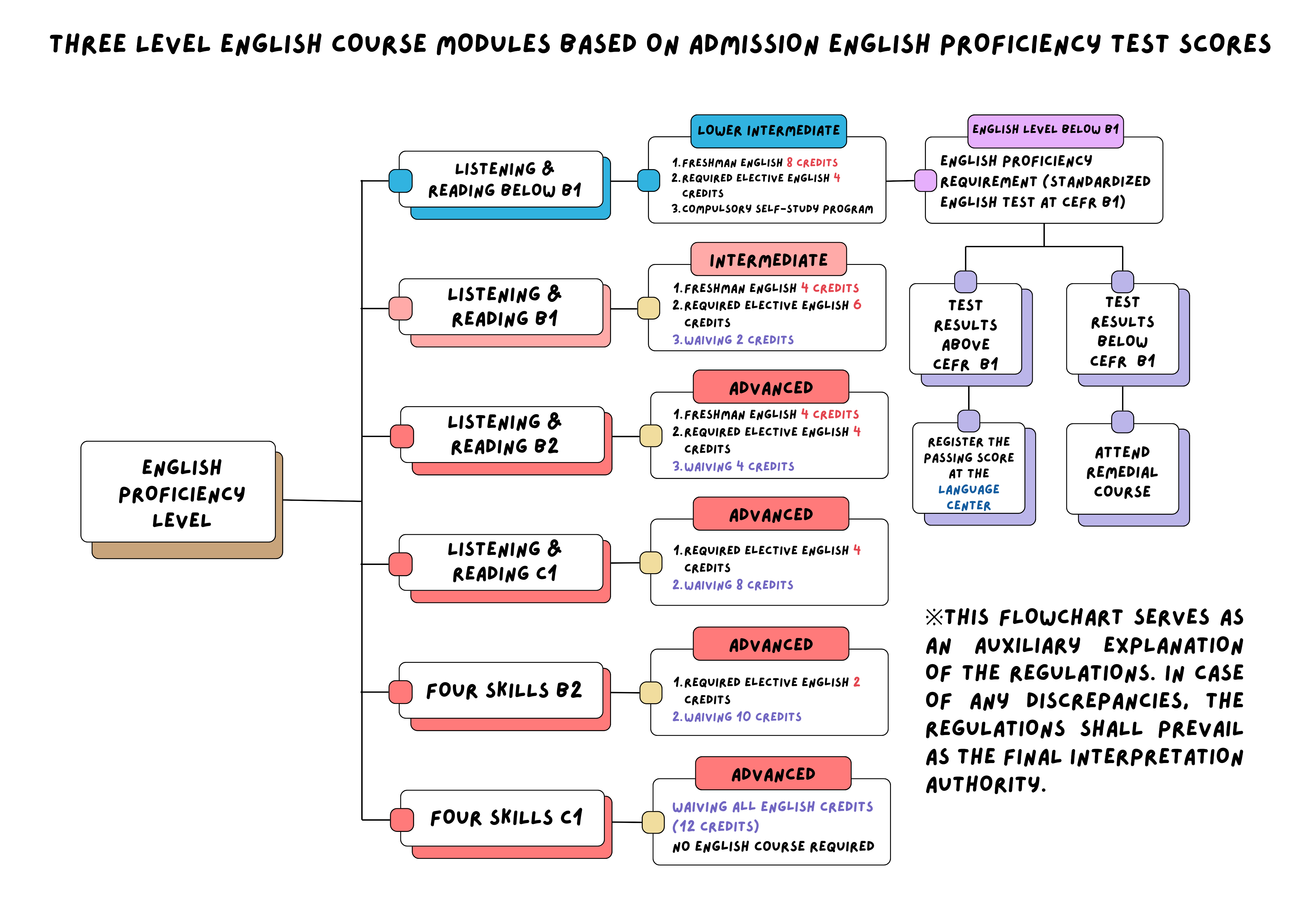
National Taiwan University of Science and Technology offers a diverse range of compulsory English courses for freshmen, divided into three levels: Lower Intermediate, Intermediate, and Advanced, aimed at improving students' English proficiency.
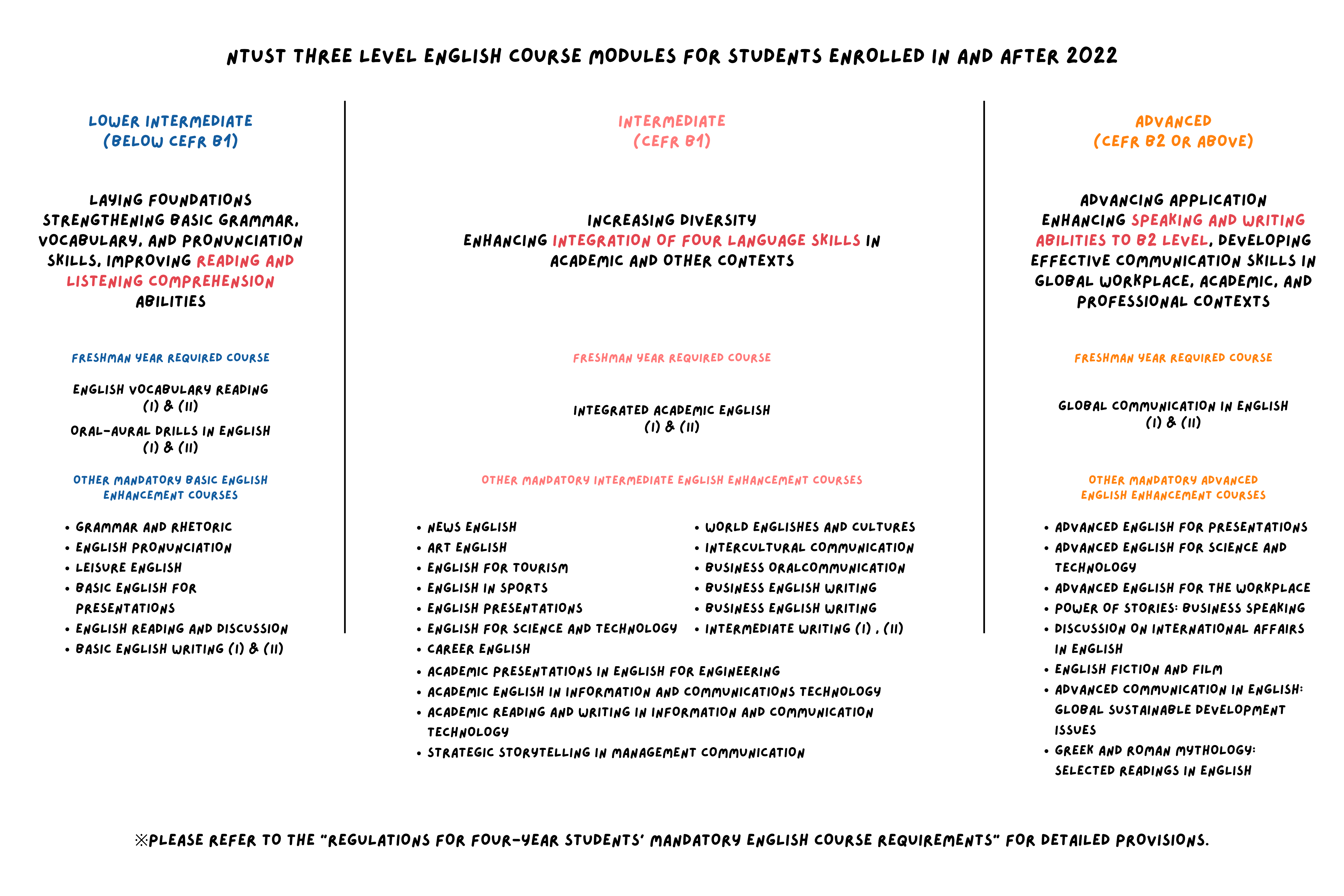
The Office of Bilingual Education Initiatives at National Taiwan University of Science and Technology offers a variety of English courses to enhance students' English proficiency and international competitiveness. The courses include:
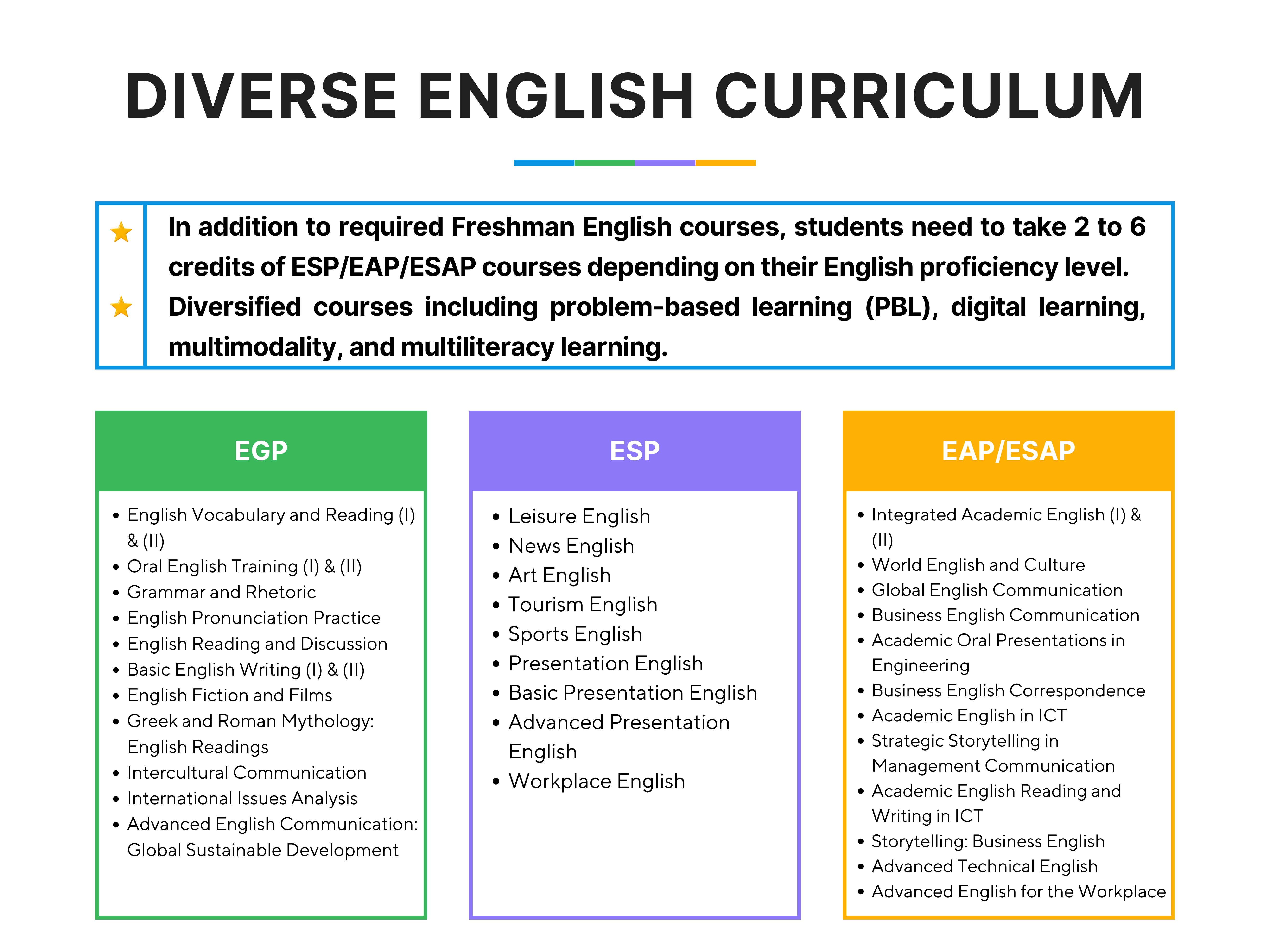
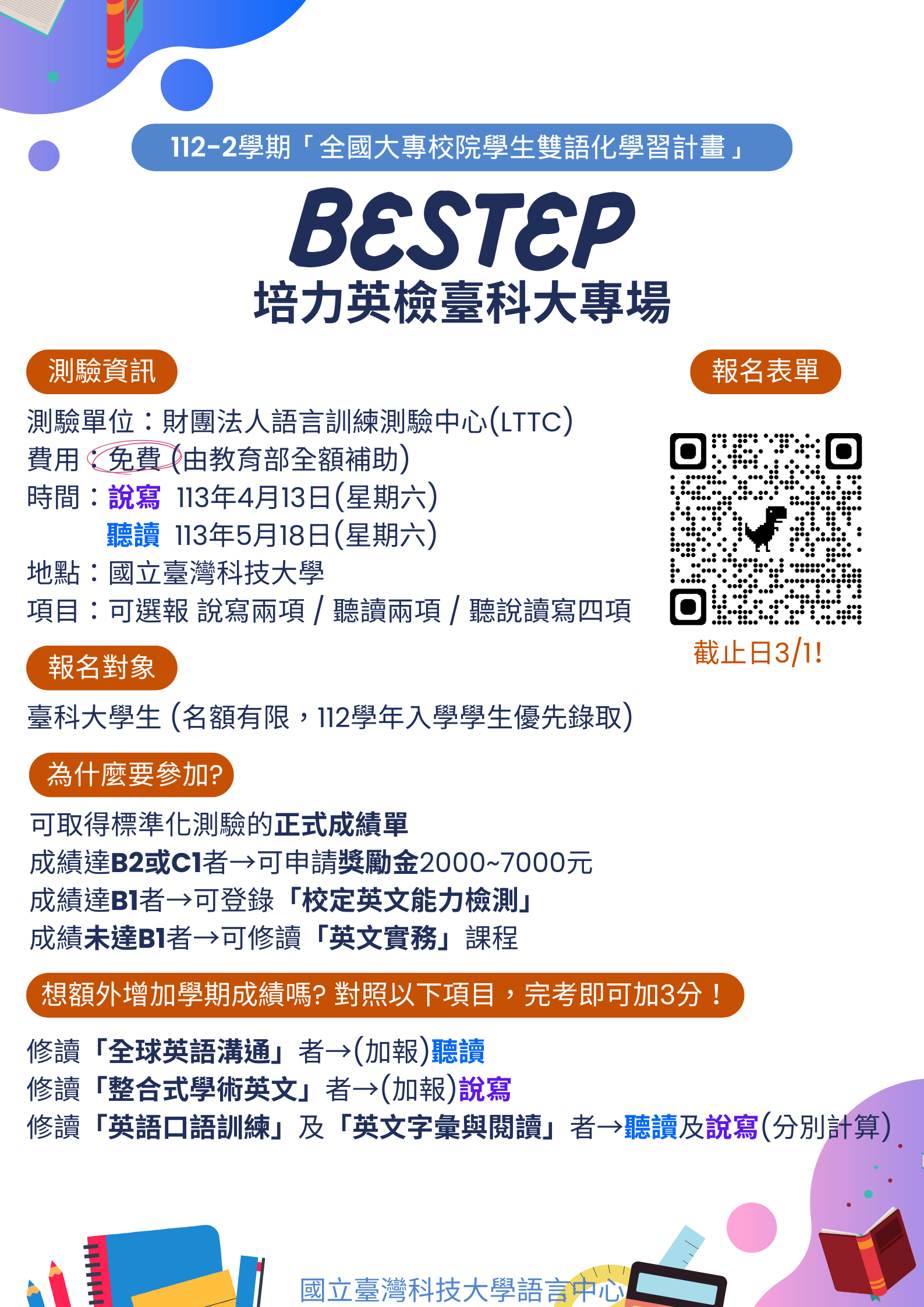
To promote the university's "BEST Program on Bilingual Education for Students in College" initiative, the summer EMI/Academic English preparatory courses will continue in the 112th academic year, helping incoming freshmen prepare for English-taught courses. The curriculum includes four professional English for Specific Academic Purposes (ESAP) courses tailored for students in different fields, facilitating their transition to professional EMI courses. For advanced modules, the freshman English course "Global English Communication" implements the "Speaking and Writing Enhancement Program (SWEP)" to allow students to continue self-directed learning using available resources outside of class. Additionally, innovative AI-assisted activities to enhance speaking abilities are being piloted, aiming to improve students' speaking and writing skills comprehensively. A professional development community for teachers, focusing on EMI and academic English, will also continue in the 112th academic year. Through sharing practical teaching experiences and workshops, teachers will enhance their course design and instructional skills in professional and academic English.

The "2024 Third NTUST UN Sustainable Development Goals (SDGs) English Presentation Competition" successfully concluded last Thursday (March 28th)! We extend our heartfelt thanks to all the hardworking participants, mentors, judges, staff, and everyone who followed and supported the competition. This year, we had 26 teams with a total of 75 participants from both undergraduate and graduate levels, spanning 15 different departments and various nationalities. The competition focused on five designated SDG topics: SDG 3 – Good Health and Well-being SDG 4 – Quality Education SDG 11 – Sustainable Cities and Communities SDG 12 – Responsible Consumption and Production SDG 13 – Climate Action Each participant utilized their expertise and engaged in interdisciplinary collaboration, integrating diverse perspectives during the teamwork process. They presented their findings through group presentations, drawing the attention of many on this prominent stage.
Read moreTo continue promoting the United Nations Sustainable Development Goals (SDGs) and enhancing students' English presentation skills, the NTUST Language Center held the "2023 Second NTUST UN SDGs English Presentation Competition" on May 12. Building on the success of last year's inaugural competition, this year's event once again showcased the talents and dedication of our students. Competition Results: First Place: Team 9, consisting of Hsin-Ju Lee and Jen Yi Yu from the Department of Applied Foreign Languages. They focused on issues faced by women in restrooms and proposed insightful solutions. Second Place: Team 7, comprising Kuan-Ting Kuo and Chih-En Huang from the Department of Electronic Engineering. Their presentation on internet addiction was innovative and thought-provoking. Third Place: Team 5, including Shannon Wu, Kanjanaporn Tangprapha "Muse," Chin-Hui Chen from the Department of Chemical Engineering, and I-Hsuan Chuang from the Department of Materials Science and Engineering. Their topic discussed how to bridge the gap between science and humanities in education.
Read moreThis year, three outstanding students who emerged from the "2022 NTUST UN SDGs English Presentation Competition" organized by Language Center, Xin-Yang Wang, Darmawansah, and Tariq Yousef Mahmoud Batat, formed a new team. They focused their research on the "EquaLearn" online tutor matching platform to explore the current state of gender inequality in science and technology fields. Their efforts earned them the first prize in the "World Technological University Network Student Competition." They will travel to Suranaree University of Technology in Thailand on November 23 to attend the annual meeting, receive their award, and present their work and share their insights.
Read more
From May 24 to 26, 2024, the EMI Research Division of the NTUST Office of
Bilingual Education Initiatives attended the JALT (Japan Association for
Language Teaching) PanSIG 2024 Conference held at Fukui University of Technology
in Fukui City, Fukui Prefecture, Japan. During the conference, they presented a
sub-project research. Presentation Topic: The Effect of EMI Preparatory Programs
on Learning and Perceived EMI Competences: Exploring Students’ Perceptions and
Experiences from an EMI Context in Taiwan
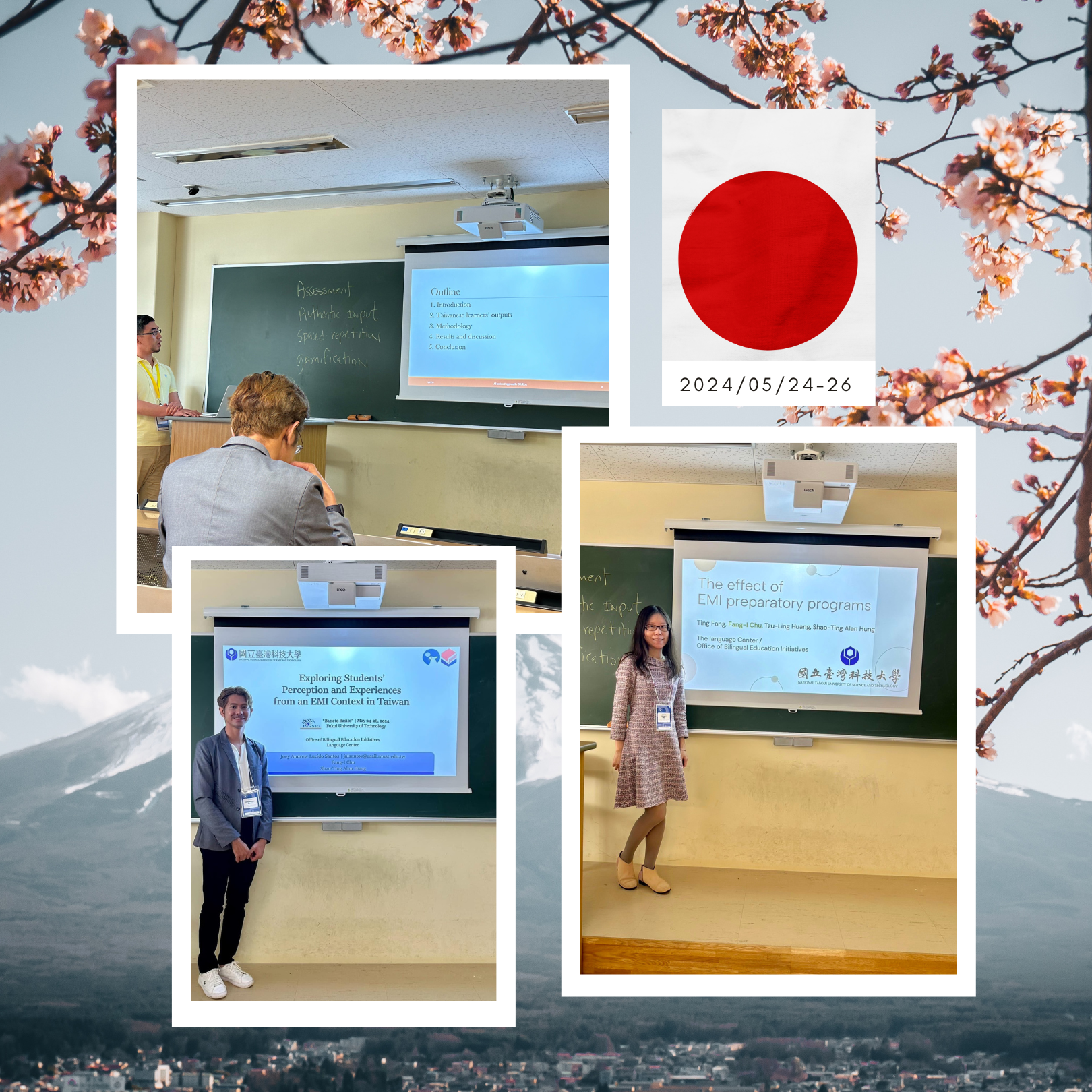
To promote professional development in English as a Medium of Instruction (EMI)
teaching, the NTUST Office of Bilingual Education Initiatives has established
the "EMI Instructor Professional Development Community Regulations." The
regulations were approved at the 628th Administrative Meeting on March 12, 2024.
The aim is to encourage teachers to form EMI professional development
communities to enhance teaching skills, develop teaching materials, share
experiences, and foster personal growth.
To promote English as a Medium of Instruction (EMI) courses and improve teaching
quality and student learning outcomes, the NTUST Office of Bilingual Education
Initiatives has established the "EMI Teaching Skills Enhancement Reward
Regulations." Approved at the 628th Administrative Meeting on March 12, 2024,
these guidelines aim to encourage teachers to innovate teaching methods, design
course content, develop teaching materials, revolutionize assessment methods,
and create an excellent teaching environment.
The NTUST Office of Bilingual Education Initiatives approved the "EMI Teaching
Assistant Training and Reward Regulations" at the 629th Administrative Meeting
on April 9, 2024. These guidelines aim to develop and enhance the skills and
quality of EMI (English as a Medium of Instruction) teaching assistants and to
reward those who demonstrate exceptional performance. The rewards are divided
into two categories: Outstanding and Excellent.
